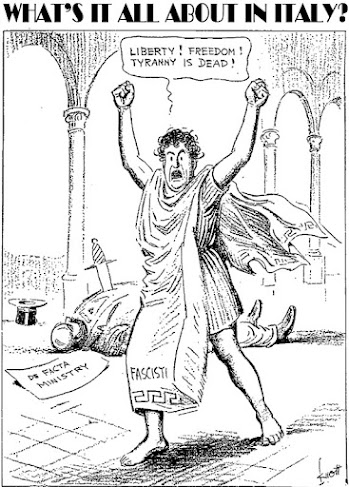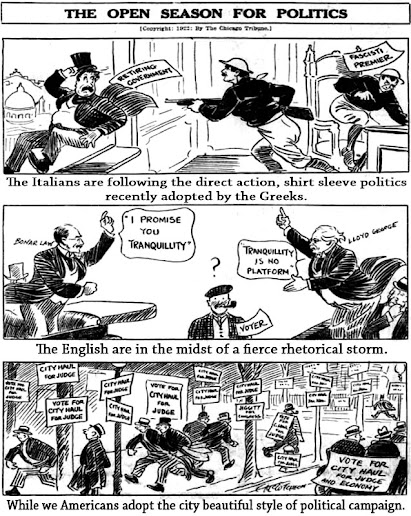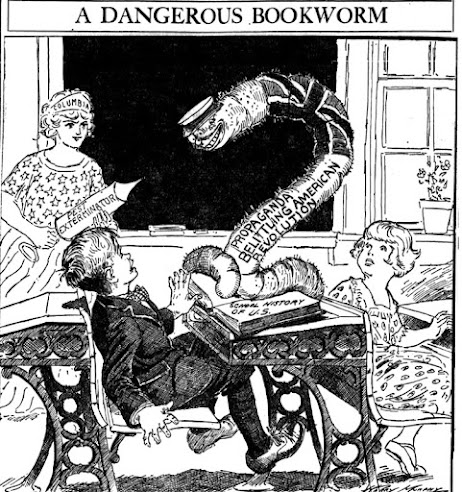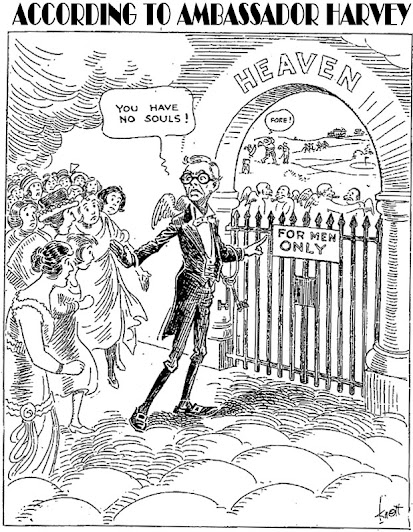Italy appears poised to have fascists in their ruling coalition, almost exactly one century after the National Fascist Party came to power the first time.
 |
| "What's It All About in Italy" by John Knott in Galveston Daily News, Oct. 30, 1922 |
Mussolini's March on Rome came right at the end of October, 1922, when most U.S. editorial cartoonists were preoccupied with their local elections for Congress and/or governorships. Not John Knott, in spite of a senate race in Texas pitting a Ku Klux Klansman against a last-ditch candidate suing in court to get on the ballot.
Between a couple gaps in the on-line record of the Galveston Daily News in October and a few days when it doesn't appear to have run Knott's cartoons, I'll concede the possibility that Knott drew something about the candidates running for office in Texas. I just haven't found it.
 |
| "A Perfect Fit" by Dorman H. Smith for Newspaper Enterprise Assn., ca. Nov. 4, 1922 |
I have come across a couple other early cartoons about the fascist victory in Italy, however. Dorman J. Smith was drawing for a national audience rather than a local one, so he wasn't as preoccupied as most cartoonists were with politics close to home. And unless I'm missing something here in an allusion that's older than Caligula, it seems to me that Smith actually approved of the fascists coming to power.
Conservatives today would never make such a mistake, would they? Would they?
 |
| "The Open Season for Politics" by John McCutcheon in Chicago Tribune, Oct. 31, 1922 |
To be fair, Americans of the 1920's had no experience with fascism yet. As far as our cartoonists a century ago were concerned, this was just another change of government in a land far away.
Nowadays, you'd think people would know better.
 |
| "The Big Four" by Grover Page in Louisville Courier-Journal, Oct. 20, 1922 |
If Italian fascists didn't yet catch the interest of editorial cartoonists in the U.S., more of them took note of the break-up of Great Britain's coalition behind Prime Minister David Lloyd George. Grover Page depicts Lloyd George joining the former leaders of the other Entente powers, U.S. President Woodrow Wilson, Italian Prime Minister Vittorio Orlando, and French Prime Minister Georges Clemenceau in involuntary retirement.
 |
| "A Dangerous Bookworm" by Harry Murphy for Star Publications, ca. Oct. 3, 1922 |
Joining Italian fascists in the repetition of history, we have this cartoon decrying wokeness in our schools. The newspaper empire of Anglophobe William Randolph Hearst was worried that impressionable schoolboys were being terrorized by textbooks infested with "propaganda belittling American Revolution."
 |
| "Still Teaching Treason" by Harry Murphy for Star Company, ca. Oct. 11, 1922 |
The textbooks weren't reminding them that many of our Founding Fathers were slave-owners, of course. Perhaps some textbook had the temerity to suggest that King George wasn't entirely wrong to expect the American colonists to help pay for the redcoats defending them from the French and Indians.
Turn we now from America's leading Anglophobe to one of its leading Anglophiles.
 |
| "According to Ambassador Harvey" by John Knott in Galveston Daily News, Oct. 28, 1922 |
Faithful followers of these Saturday History Tours may remember John Cassel having caricatured U.S. Ambassador to the Court of St. James, George Brinton McClellan Harvey with typographical symbols during a photoengravers' strike. Reported in the London Daily Telegraph, Ambassador Harvey gave an address to the Authors Club of London on the theme "Have Women Souls?"
At the start, Ambassador Harvey gave that "[O]ur preceptors in religion... would declare with concordant impatience, if pressed, that of course women have souls, and it is absurd, if not indeed positively sacrilegious, to suggest a doubt to the contrary."
Foolishly, he continued.
"And yet, they teach with like unanimity that woman is not the equal of man in the possession of inherent rights, but is and was designed by God to be his subordinate and subject."
Going on, Harvey observed that the Ten Commandments were written "exclusively for men": the fourth commandment lists who must not work in the home on the sabbath without mentioning wives; while the tenth forbids coveting one's neighbor's wife, but not one's neighbor's wife returning the coveting.
 |
| "Not a Woman Here" by John Cassel in New York Evening World, Oct. 26, 1922 |
"There is no recognition in the decalogue of the possession of souls or inherent rights by women. The fact of course is that women are not only not bound by but freed at last by inference of any obligation to observe the requirements of our fundamental religious law. ...
"[E]ither the commandments should be revised to meet the requirements of modern conditions, or a specific decalogue should be constructed exclusively for women."
Harvey, it must be noted, was not being completely serious, and his audience received his talk in the light-hearted manner in which it was intended. Yet the ambassador had earned a reputation for shooting his mouth off, and his remarks rankled feminists and clergy on both sides of the Atlantic.
 |
| "Aren't They Going to Offer the Lady a Chair" by John Knott in Galveston Daily News, Oct. 18,1922 |
Senate-appointee Rebecca Felton (D-GA, pictured here by John Knott) had a few words to say when reporters showed her Ambassador Harvey's remarks.
"Ambassador Harvey is at home in politics — and he seems to be at a banquet table — but he is all wrong and away out of his element in commenting on the Ten Commandments and their application to women. ... That's the most amusing thing I've seen today. Isn't it funny how so many men try to change things that have been in existence for thousands and thousands of years.
"I'm glad I saw that dispatch, though. It does one so much good to be amused when suffering from a bad cold. I feel a great deal better already."
 |
| "She May Come" by Clifford Berryman in Washington (DC) Evening Star, Oct. 5, 1922 |
Rebecca Felton has the distinction of being the first woman to serve as United States Senator, although it was only for one day. Appointed by the governor in an effort to appeal to women voters (in a state that resisted women's suffrage) after the death of Sen. Thomas Watson, she was named with the understanding that she wouldn't stand in the way of the men running for the seat in November.
As these two cartoons suggest, there was the distinct possibility that the Senate would not be in session to seat the 87-year-old Felton at all. Senate leadership did, however, call the body into session on November 21 just so she could be sworn in and give a speech.
In that speech, Felton, an advocate of both Prohibition and women's suffrage predicted, "When the women of the country come in and sit with you…you will get ability, you will get integrity of purpose, you will get exalted patriotism, and you will get unstinted usefulness."
She might be a heroine to the feminist movement today if she weren't also an outspoken white supremacist and erstwhile slave owner.
You have to like Clifford Berryman's awkward attempt to address "Mrs. Senator Felton," though.
No comments:
Post a Comment